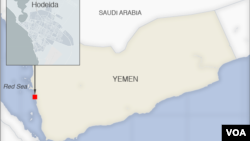Arab media are reporting that Saudi-led coalition forces have captured dozens of Houthi militia fighters after taking control of large parts of Yemen's Hodeida airport. Witnesses say the Houthis have been reinforcing their positions around Hodeida's port, the country's largest, as coalition forces try to tighten their noose on the city.
VOA could not independently confirm if the Houthis still controlled any parts of the airport complex.
Hodeida airport is approximately 10 kilometers from the city's port, which is the real objective of the battle. The port supplies the capital, Sana'a, with about 70 percent of its needs, according to Arab media.
Witnesses say the Houthis have been reinforcing their positions around Hodeida's port, the country's largest, as coalition forces try to tighten their noose on the city.
According to witnesses, Apache helicopters belonging to the coalition fired on Houthi forces along Hodeida's coastal road, as the Houthis fired back with machine guns and mortar rounds.
Yemeni journalist Ezzat Mustapha told al Arabiya TV that neighborhoods along the coastal road "have narrow streets and are heavily populated," making them difficult to enter. Houthi fighters reportedly have dug trenches along the seafront, cutting water and electricity lines and forcing many residents to flee.
Sky News Arabia accused the Houthis of shelling civilian areas, although it was not immediately clear what the Houthis were firing at. The Houthis also have positioned tanks at various entrances into the city.
Yemen analyst Greg Johnsen, who works for the Arabia Foundation and spent several years on the U.N. Security Council's Yemen Panel of Experts, told VOA the battle for Hodeida has been a long time in the making.
"The Emiratis, the Saudis, and the internationally-recognized government of Yemen — they've wanted to take Hodeida for quite a long time," he said. "The Houthis know this and the Houthis have been planning a defense of the city for quite a while, as well. So both sides are determined and both sides have their plans, and now we see how it plays out."
The United Arab Emirates, which is leading the military forces in the battle for Hodeida, has been pushing to pressure the Houthis, according to Johnsen.
"They are slowly tightening the noose on the Houthis and ratcheting up pressure," he said. "So they're trying to do this in a way that won't exacerbate the humanitarian crisis, while also attempting to put military pressure on the Houthis."
Hilal Khashan, who teaches political science at the American University of Beirut, said he key objective of the military operation is to apply tremendous pressure to force the Houthis to withdraw from Hodeida's harbor without causing serious damage to the port's infrastructure.
The goal, he added, is to convince the Houthis that "this is an unwinnable war so that they would pull out from Hodeida harbor and allow a United Nations team to administer the harbor, with the understanding that the Houthis would also continue to receive supplies through the harbor."
Khashan added that the United States has urged the UAE not to target Hodeida's port infrastructure so that it may still be used after the battle is over. Aid groups, however, have warned that serious damage to the port could severely aggravate Yemen's already dire humanitarian crisis.
Johnsen noted that U.N. special envoy Martin Griffiths, who briefed the U.N. Security Council Monday, has been attempting to broker a political solution to the conflict which would bring the Houthis back to the country's stalled national dialogue talks. Arab media reports that Griffiths left Sana'a for the Jordanian capital, Amman, Tuesday afternoon.













